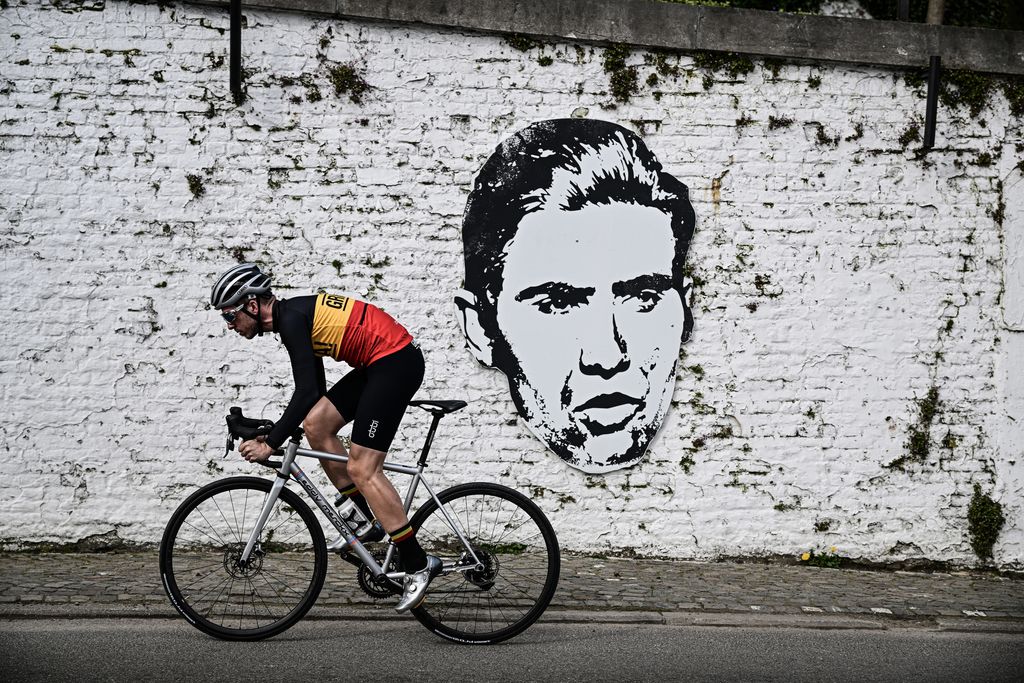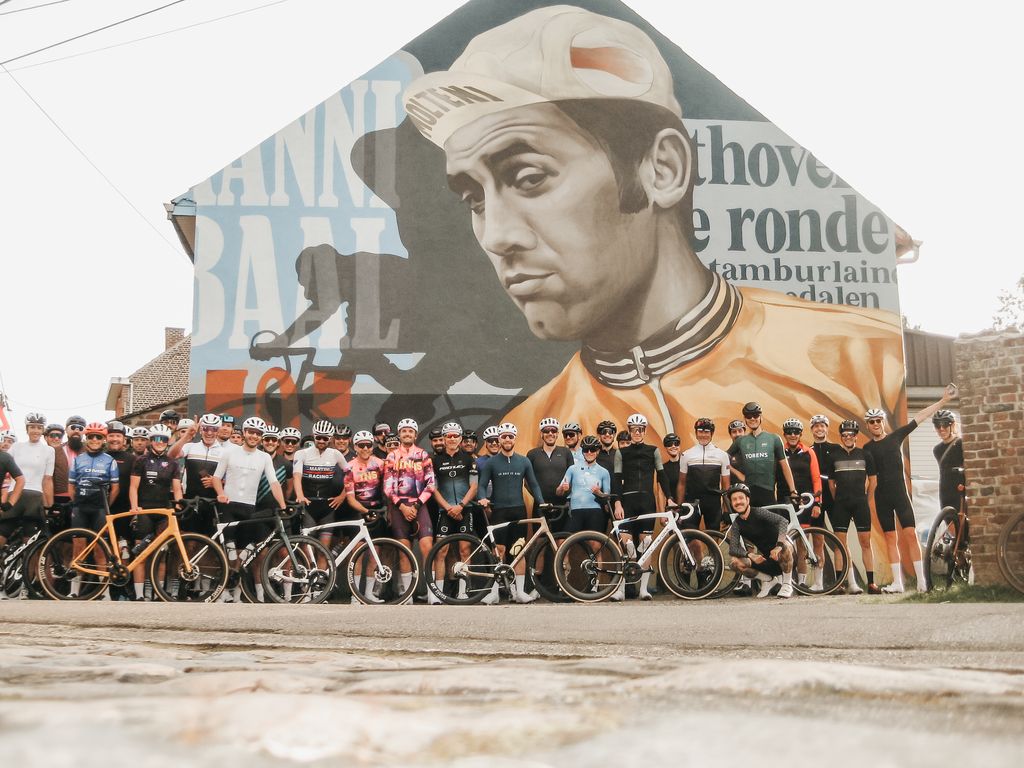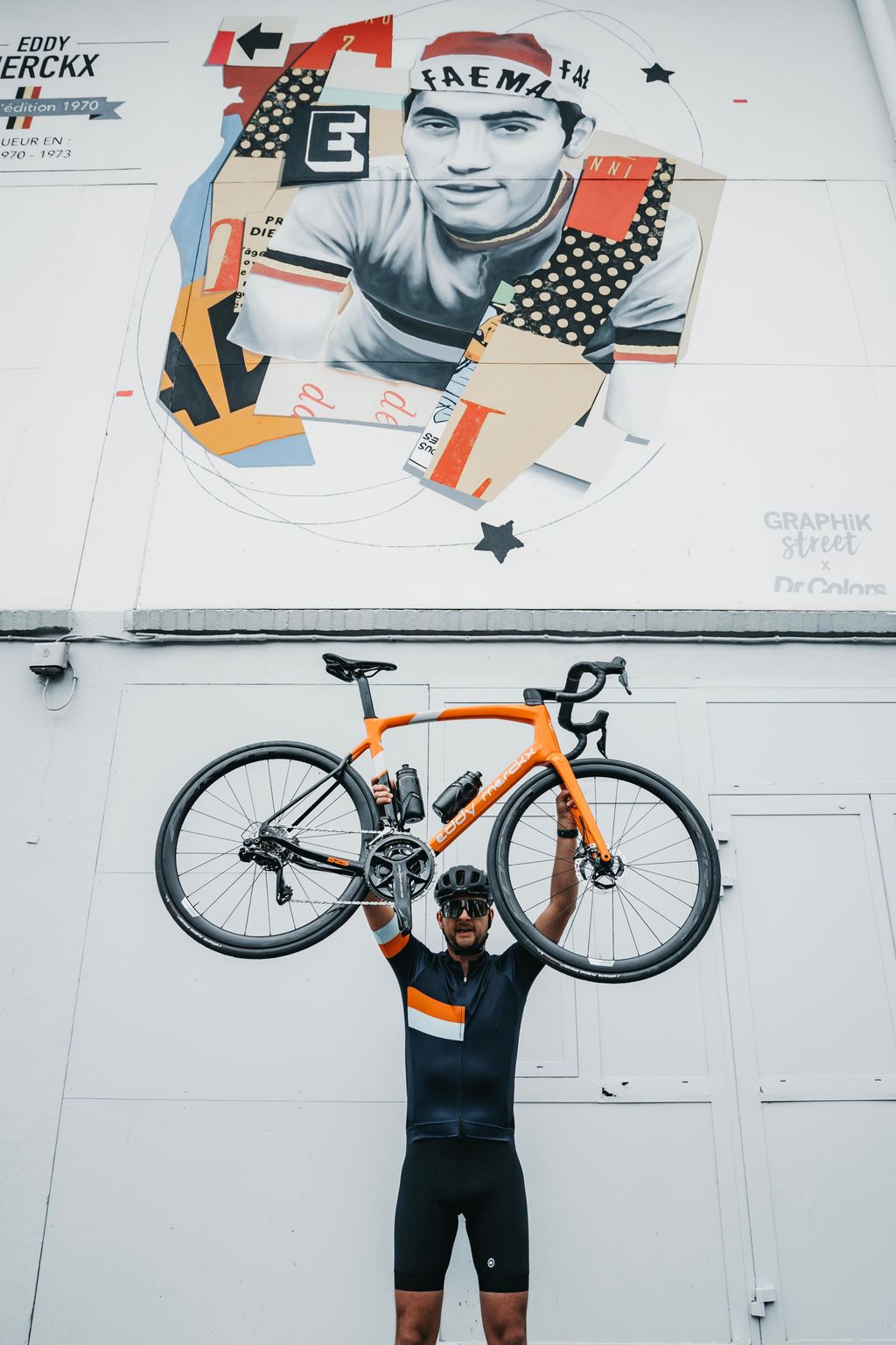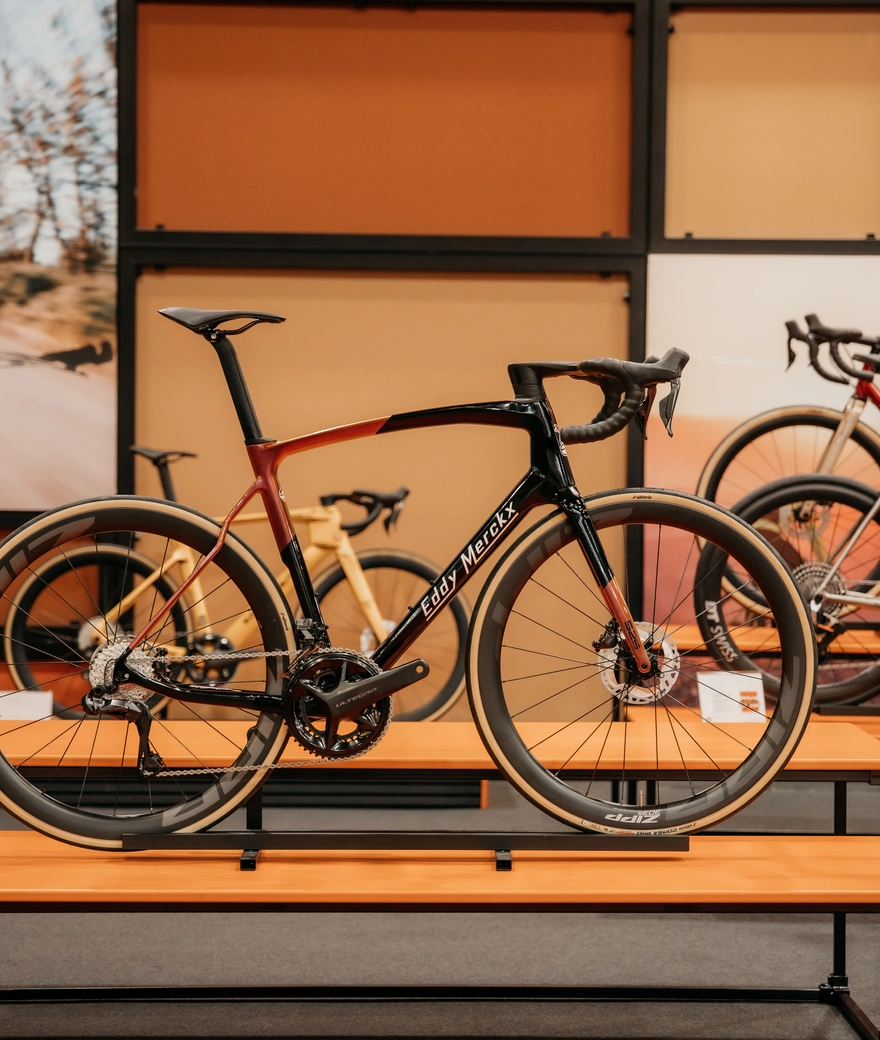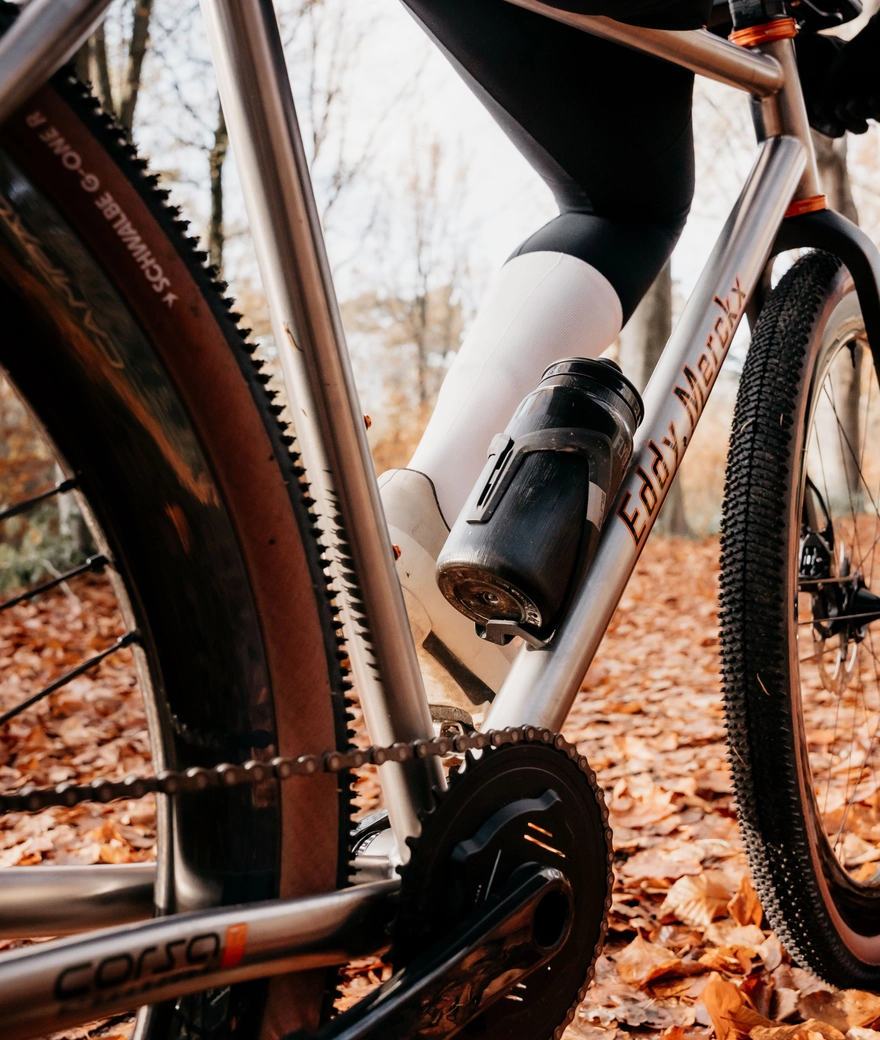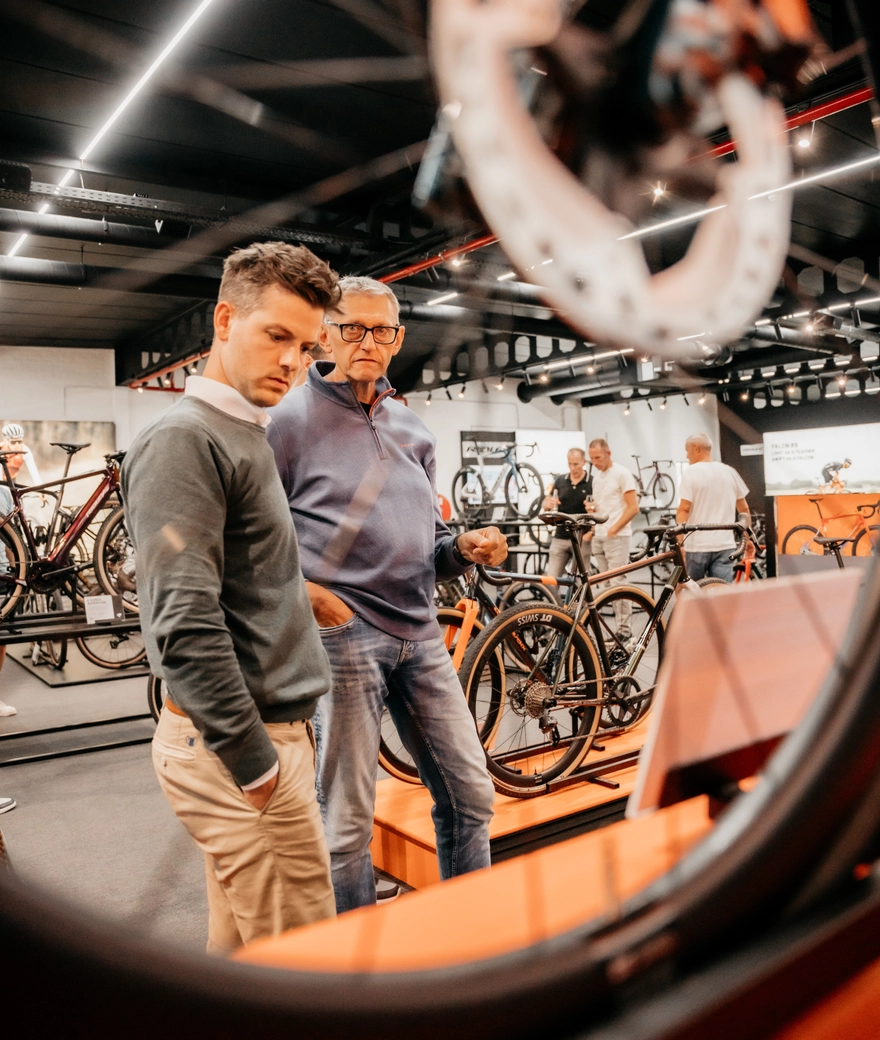Grocer, Supporter, Perfectionist: The Man Behind the Cannibal
525 victories, five Tour de France wins, world champion in Heerlen, Mendrisio, and Montreal… The numbers from Eddy Merckx’s career are ingrained in cycling’s collective memory. But behind the Cannibal was also a warm man with a big heart. Grocer, supporter, perfectionist—Eddy Merckx was a man of many talents.
Last year, during our social ride, we visited the giant mural of Eddy Merckx in his birthplace, Kiezegem. A few months after Eddy was born, the Merckx family moved to Brussels. Young Eddy grew up in Sint-Pieters-Woluwe and was often found at Goudvinkenplein. His parents ran a grocery store there, while Eddy, just a few meters away, stood out for his boundless energy and sporting spirit. During this time, he played tennis, basketball, and football. As a tribute, this place was renamed Eddy Merckx Square a few years ago.
The Merckx family was not wealthy, and young Eddy desperately wanted to help his parents. So, he secretly took 100 francs from the grocery store’s cash register every day, hiding the money in a hidden nook in the attic. He thought he was saving for his parents, but his mother eventually discovered his secret stash, which had grown to around 4,000 Belgian francs (about 100 euros). Neither Eddy’s savings nor his parents' store was a goldmine. Along with his brother Michel and sister Micheline, the family slept five to a room.
Last year, during our social ride, we visited the giant mural of Eddy Merckx in his birthplace, Kiezegem. A few months after Eddy was born, the Merckx family moved to Brussels. Young Eddy grew up in Sint-Pieters-Woluwe and was often found at Goudvinkenplein. His parents ran a grocery store there, while Eddy, just a few meters away, stood out for his boundless energy and sporting spirit. During this time, he played tennis, basketball, and football. As a tribute, this place was renamed Eddy Merckx Square a few years ago.
The Merckx family was not wealthy, and young Eddy desperately wanted to help his parents. So, he secretly took 100 francs from the grocery store’s cash register every day, hiding the money in a hidden nook in the attic. He thought he was saving for his parents, but his mother eventually discovered his secret stash, which had grown to around 4,000 Belgian francs (about 100 euros). Neither Eddy’s savings nor his parents' store was a goldmine. Along with his brother Michel and sister Micheline, the family slept five to a room.
Only the Bike
Eddy often had to help out in the store, but he disliked the routine work—he only wanted to race. At sixteen, he left school. From that moment on, the bike was all that mattered. His father supported his love for cycling, often giving his son's bike a final polish the night before a big race. Eddy inherited his deep interest in cycling equipment not only from his father but also from former pro Félicien Vervaecke. Vervaecke, who lived on the same street, opened a bike shop and eventually became one of Eddy’s key mentors.
Eddy’s sporting success is well known. He wanted to win every race, earning him the nickname “The Cannibal.” It is said that he had nightmares whenever he went a week without winning. He was already a poor sleeper, but on those restless nights, he would get up and head to his garage, where dozens of bikes, hundreds of wheels, and countless tires awaited assembly.
This obsession with equipment defined him. He later admitted that sometimes he went too far. The bicycle was his passion, and he worked day and night to improve his ultimate tool. His love for cycling equipment naturally led to his own bicycle brand. That his bikes became some of the best in the world was no surprise, given his relentless pursuit of perfection.
Eddy often had to help out in the store, but he disliked the routine work—he only wanted to race. At sixteen, he left school. From that moment on, the bike was all that mattered. His father supported his love for cycling, often giving his son's bike a final polish the night before a big race. Eddy inherited his deep interest in cycling equipment not only from his father but also from former pro Félicien Vervaecke. Vervaecke, who lived on the same street, opened a bike shop and eventually became one of Eddy’s key mentors.
Eddy’s sporting success is well known. He wanted to win every race, earning him the nickname “The Cannibal.” It is said that he had nightmares whenever he went a week without winning. He was already a poor sleeper, but on those restless nights, he would get up and head to his garage, where dozens of bikes, hundreds of wheels, and countless tires awaited assembly.
This obsession with equipment defined him. He later admitted that sometimes he went too far. The bicycle was his passion, and he worked day and night to improve his ultimate tool. His love for cycling equipment naturally led to his own bicycle brand. That his bikes became some of the best in the world was no surprise, given his relentless pursuit of perfection.
Supporters and Rivals
His total dominance and heroic victories led to legendary stories that have stood the test of time. One of the most famous anecdotes is from the 1975 Tour of Flanders. Over 100 kilometers from the finish, Frans Verbeeck broke away with Merckx, only to reach the finish line utterly exhausted, half a minute behind the winner. “It’s unbelievable, Fred, how he rides. (...) He’s five kilometers per hour too fast for us. I don’t know what it is. He’s riding twice as fast as last year,” the runner-up stammered to commentator Fred De Bruyne.
Source video: YouTube channel Vermarc
Yet, 1975 would also mark the downfall of the cycling god.
Eddy had passionate fans worldwide. Since he rode for the iconic Italian team Molteni, he was adored in Italy. But in France, it was a different story. His relentless dominance turned competitors into mere spectators, creating resentment over time. This led to a shocking low point in the summer of 1975. During the climb of the Puy-de-Dôme, a French spectator punched him in the liver. After the race, Merckx confronted the attacker, who was ultimately fined a single franc in damages.
The next day, Eddy also broke his cheekbone. These combined setbacks prevented him from fully defending his chances in that Tour, costing him what would have been a record-breaking sixth victory. Despite everything, his determination still secured him second place. However, looking back, he later admitted it was a mistake to continue to Paris. After that infamous punch, the Cannibal would never roar in the same way again.
Still, his status as a national hero remained unchanged. After struggling with sponsorships and physical ailments, Merckx retired from professional cycling on March 19, 1978, at the Omloop van het Waasland, though he only announced his decision weeks later.
Eddy had passionate fans worldwide. Since he rode for the iconic Italian team Molteni, he was adored in Italy. But in France, it was a different story. His relentless dominance turned competitors into mere spectators, creating resentment over time. This led to a shocking low point in the summer of 1975. During the climb of the Puy-de-Dôme, a French spectator punched him in the liver. After the race, Merckx confronted the attacker, who was ultimately fined a single franc in damages.
The next day, Eddy also broke his cheekbone. These combined setbacks prevented him from fully defending his chances in that Tour, costing him what would have been a record-breaking sixth victory. Despite everything, his determination still secured him second place. However, looking back, he later admitted it was a mistake to continue to Paris. After that infamous punch, the Cannibal would never roar in the same way again.
Still, his status as a national hero remained unchanged. After struggling with sponsorships and physical ailments, Merckx retired from professional cycling on March 19, 1978, at the Omloop van het Waasland, though he only announced his decision weeks later.
From Anderlecht to Axel
Outside of cycling, Eddy had a soft spot for Anderlecht. Initially, he supported RWDM, but after a friend was dismissed from the club, he switched allegiances. Star footballer Paul Van Himst became a good friend, and today, Merckx is often spotted in the stadium, sometimes alongside his cycling successor, Remco Evenepoel.
In cycling, Eddy found a new challenge as the Belgian national coach, a role he held from 1986 to 1997. Johan Museeuw even credited Merckx for his 1996 world title, revealing that Eddy had advised him to raise his saddle by two millimeters—a small adjustment that made all the difference. This was a testament to Eddy’s unparalleled knowledge of cycling.
One of his most emotional moments, however, came not as a coach but as a co-commentator. At the 2004 Olympic Games in Athens, he was on-site as his son Axel unexpectedly won bronze in the road race. As Axel crossed the finish line, he pointed to his father. Despite Eddy’s own legendary career, he had never been prouder than at that moment.
In cycling, Eddy found a new challenge as the Belgian national coach, a role he held from 1986 to 1997. Johan Museeuw even credited Merckx for his 1996 world title, revealing that Eddy had advised him to raise his saddle by two millimeters—a small adjustment that made all the difference. This was a testament to Eddy’s unparalleled knowledge of cycling.
One of his most emotional moments, however, came not as a coach but as a co-commentator. At the 2004 Olympic Games in Athens, he was on-site as his son Axel unexpectedly won bronze in the road race. As Axel crossed the finish line, he pointed to his father. Despite Eddy’s own legendary career, he had never been prouder than at that moment.
Source video: YouTube channel Loterie Nationale Loterij
As a true legend, Eddy Merckx will forever be part of cycling history. He was named Belgian of the Century, had a Brussels metro station named after him, appeared in Asterix and Suske en Wiske comics, was immortalized in songs by Fixkes, and was the subject of countless books and TV series. To this day, he is regarded worldwide as the greatest cyclist of all time. All thanks to his unbreakable love for cycling and his relentless pursuit of perfection.


